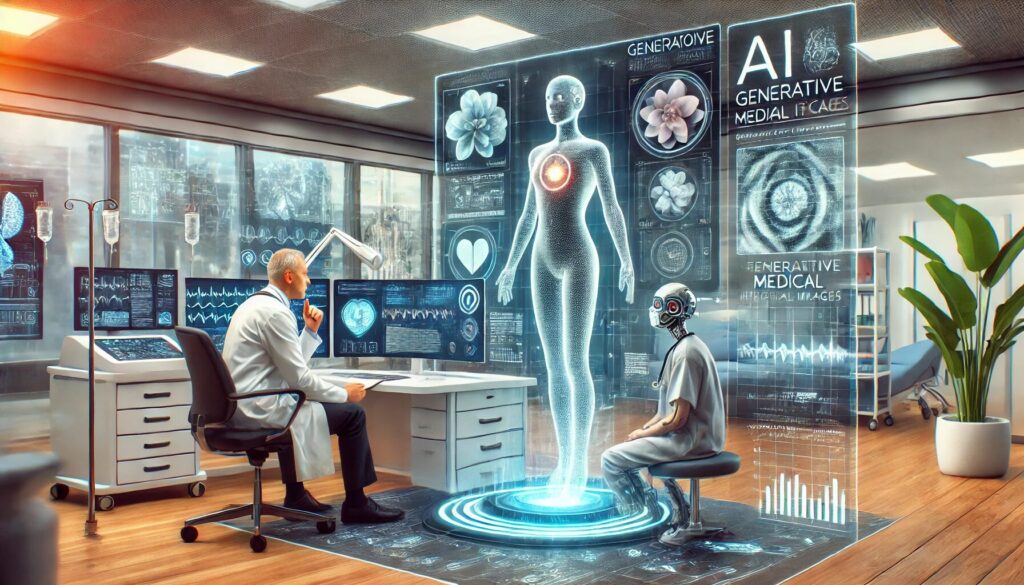
Reading
As dusk falls on traditional medical practices, a new era of healthcare is dawning with the rise of generative AI. This exciting technology is rapidly changing how doctors diagnose, treat, and interact with patients. Generative AI helps medical professionals make informed decisions quickly and creates new possibilities in healthcare.
One fascinating use of generative AI is in creating personalized treatment plans. By analyzing a patient’s medical history, genetic information, and current health data, AI can suggest tailored treatments that are more likely to be effective. This approach is especially feasible for complex conditions where one-size-fits-all treatments often fall short.
A more relatable example of generative AI in healthcare is its use during doctor consultations. Imagine you’re describing your symptoms to your doctor. As you speak, a generative AI system listens and instantly provides your doctor with relevant medical information, possible diagnoses, and suggested questions to ask. This helps your doctor exploit all available medical knowledge to make a more accurate diagnosis. The AI can even generate visual aids or explanations to help you better understand your condition and treatment options.
Generative AI is also transforming medical imaging. It can enhance low-quality images, generate synthetic medical images for training, and even predict how diseases might progress over time. This helps doctors spot potential issues earlier and plan better treatments.
Some people feel petrified about the idea of AI being involved in their medical care. They worry about privacy and the reliability of AI-generated information. However, experts emphasize that generative AI is a tool to assist healthcare providers, not replace them. The goal is to combine AI capabilities with human expertise for better patient care.
As generative AI continues to evolve, it’s receiving kudos from many in the medical community. Doctors using this technology effectively are providing more precise, efficient, and personalized care to their patients. The future of healthcare looks promising, with generative AI and human knowledge working together to keep us healthy in ways we never thought possible.
Reading Comprehension Quiz
- How does generative AI help in creating treatment plans?
a) By replacing doctors
b) By analyzing patient data and suggesting personalized treatments
c) By performing surgeries
d) By making medicines cheaper - What is one way generative AI assists during doctor consultations?
a) By diagnosing patients without the doctor
b) By providing doctors with relevant information and suggested questions
c) By replacing the need for in-person visits
d) By prescribing medications automatically - According to the passage, how is generative AI transforming medical imaging?
a) By taking better photographs
b) By replacing all X-ray machines
c) By enhancing images and predicting disease progression
d) By making MRI machines obsolete
Discussion Questions
- How would you feel if your doctor used generative AI during your consultation? Do you think this could improve your healthcare experience? Why or why not?
- Can you think of any potential risks or challenges of using generative AI in doctor-patient interactions? How might these be addressed?
Interactive Activity
Watch the video: Doctors Who Code: Why Physicians Should Build Artificial Intelligence | Logan Nye | TEDxBoston
Video Summary
While the provided TED Talk, “Doctors Who Code: Why Physicians Should Build Artificial Intelligence | Logan Nye | TEDxBoston,” doesn’t directly focus on generative AI in everyday consultations, it offers valuable insights into AI’s potential applications in healthcare diagnostics.
The video highlights two key areas where AI is impacting diagnoses:
- Improved Accuracy: Dr. Nye showcases the development of an AI system that can differentiate between two similar-looking tumors with 90% accuracy compared to the traditional 50% human success rate. This demonstrates AI’s potential to significantly improve diagnostic precision.
- Addressing Data Scarcity: The video explores how generative AI can create synthetic medical data, particularly for rare conditions like enchondroma. This allows AI systems to be trained even with limited real-world data, paving the way for more accurate diagnoses in remote areas with limited access to specialists.
Overall, the video emphasizes the potential of AI to revolutionize healthcare diagnostics by enhancing accuracy and overcoming data limitations. While it doesn’t directly address generative AI in consultations, it provides valuable insights into the broader role of AI in improving patient care.
